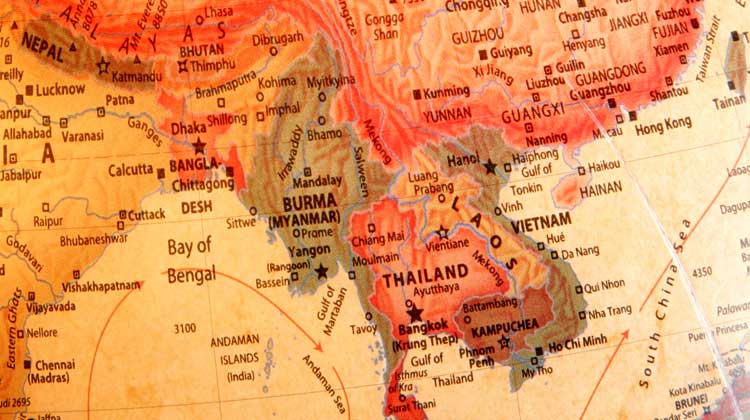
Human rights groups are calling on the U.S. government to reinstate sanctions against Burma (Myanmar) in response to recent military-led mass killings and other brutalities perpetrated against the largely Christian Kachin ethnic minority there, as well as the Rohingya.
In the wake of a string of crimes against the Rohingya, a mostly Muslim ethnic minority from Burma’s Rakhine State, the Burmese military has moved on to wreaking havoc on Kachin villages, churches, and communities. Officially, the U.S. considers the killings “ethnic cleansing,” which is one step away from genocide, and is being urged by groups such as the Faith Coalition to Stop Genocide in Burma and others to change this rating.
The U.S. State Department held a vigil in Foggy Bottom in Washington, D.C., last month to honor and draw attention to thousands of recent Burmese victims as part of its Ministerial to Advance Religious Freedom.
Speakers at the vigil included Nicolee Ambrose, spokeswoman for the Faith Coalition; Nadine Maenza, from the U.S. Commission on International Religious Freedom; Mike Farris, president of the Alliance Defending Freedom; a Rohingya survivor; and a former Rohingya member of the Burmese Parliament. At the vigil, Ambrose read a statement from Rep. Joe Wilson (R-S.C.).
The House and Senate introduced bills last year to reinstate partial sanctions, but Burmese advocates want more teeth in these bills, which currently only target the Burmese military.
According to Ambrose, thousands have been killed, including women and small children, villages bombed and burned, and tens of thousands of Rohingya and Kachin refugees have been forced to flee to neighboring countries such as Bangladesh and China.
“I personally visited the world’s largest refugee camp this spring in Cox’s Bazar, Bangladesh,” Ambrose said at a press conference held in mid-July at the National Press Club. “I remain challenged in my abilities to describe the unimaginable evil which was enacted on these civilians. The [Burmese military] now consider their work ‘done’ in Rakhine State and have moved on to Kachin State, which is home to approximately 1.6 million ethnic Kachin Christians.”
In September 2016, the United States lifted sanctions against Burma after Aung San Suu Kyi, a widely lionized political dissident and Nobel Prize recipient, became prime minister. Shortly after, the tension between the Burmese Buddhist majority and smaller ethnic groups exploded. Although there was violence on both sides, the vast majority of the violence was committed by the Burmese military against the targeted minorities, the Rohingya, and now the Kachin, in particular.
Hundreds of Rohingya villages were burned, civilians shot or stabbed to death, and 52 percent of the women who somehow managed to survive were raped, often multiple times, according to a United Nations report. Babies were ripped from their mothers’ arms and killed in front of them. These same kinds of atrocities have been repeated against the Kachin.
“There are now a minimum of 130,000 refugees [inside Burma],” said Bob Roberts, a pastor who co-chairs the Faith Coalition. “We really don’t know exactly how many. There’s nowhere for these people to go.”
The Kachin Christians are mostly Baptists who are descended from converts dating back to the earliest American Protestant missionary to Burma, Adoniram Judson. He spent almost 40 years there, from 1812 until his death in 1850.
Kachin State, where most of the Kachin people live, is landlocked, so it is more difficult to escape the murderous military units. The units started attacking the Kachin near the edges of Kachin territory and are now heading forward, hoping to encircle and trap the remaining Kachin, according to Roberts, who recently returned from a trip to Burma to assess the situation inside the country.
“About 458 villages have been destroyed in the Kachin State,” he said. “In the last few months, [the killing] sped up pretty dramatically. Every single church that is there … is now a refugee center.”
The bunching up of refugee clusters in churches is making them an easy target for the soldiers, Roberts added. Burma’s isolation has made it difficult to assist the refugees and has limited the flow of information about the atrocities that were, and are still, occurring.
“It is incumbent upon us … to bring attention to who they are and what they’re going through,” Roberts said. “Over 60 churches have been either bombed or burned to the ground. If you look at what’s happened just in the last year alone, there have been 500 military attacks upon the residents of the villages.”
On the site of the destroyed churches, he said, Buddhist pagodas have been placed instead, to deter Christians from returning there.
The ethnic cleansing has deep historical roots, Roberts said. Both the Rohingya and the Kachin have histories of being oppressed by the ruling Buddhist majority.
The Rohingya were classed as inferior and denied Burmese citizenship. They were forced to limit their family size to two children—a restriction that wasn’t placed on the majority of the Burmese. They were also attacked, off and on, before the all-out ethnic cleansing that started last year. The Kachin experienced deadly attacks in the past few years as well, despite being citizens.
Imam Malik Mujahid, a Muslim cleric who chairs the Faith Coalition, explained that although both groups are indigenous to the region, they have never been accepted by the majority of Burmese.
“Sixty percent of Burmese are [the] Burmar race,” he said. “They have been persecuting these people because they are part of a minority. [Out of] 3 million Rohingyas [originally], now there are only two-[hundred thousand] to three-hundred-thousand left in the country.”
If sanctions aren’t imposed promptly by the United States, there are no limits to what the Burmese government could decide to do next, Roberts warned.
“What concerns me is this: When a military or people are radicalized to this level of intensity, it just doesn’t stop,” he said. “You don’t turn that switch off and on.”
© 2018 Homeland411
Please subscribe to our free weekly electronic newsletter.